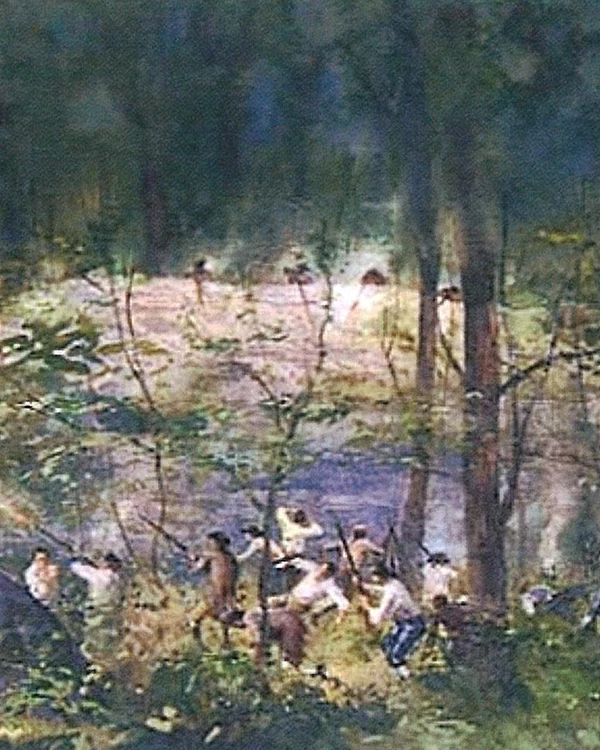Last updated: December 11, 2025
Person
Joseph Coulon de Jumonville

NPS
Joseph Coulon de Villiers de Jumonville came from a military family with six sons. He began as a cadet in the colonial regulars and rose to the rank of second ensign. He gained military experience in conflicts against opposing European powers and American Indian nations.
In the mid-eighteenth century, relations were tense between France and Britain in the Ohio River Valley territory. In 1753, the French had built two forts, Fort Presque Isle and Fort LeBoeuf. Attempts by the British to compel the French to retire in 1753, and to build a British fort at the Forks of the Ohio in the winter of 1754, were both unsuccessful. That spring, the French seized the British fort and established Fort Duquesne in its place.
In April and May of 1754, young George Washington was leading a group of Virginia soldiers to support the British presence at the Forks of the Ohio, cutting a road along their way. Meanwhile, on May 23rd, 1754, Jumonville and thirty-three men had left Fort Duquesne with a mission to discover the British forces trespassing on French territory, to send an informant back to the French, and then to present the offending British with an official summons. While Washington and his men were encamped at the Great Meadows, he was informed that a hostile French force was approaching. These rumored aggressors were none other than Jumonville and his men.
Washington responded by leading a group of forty men to meet their American Indian allies near the site of the French encampment. This miserable seven-mile trek took most of the night of May 27th. By the morning of May 28th, Washington’s party was able to join with their American Indian allies to devise and execute a plan to surround the unsuspecting French. The skirmish at Jumonville Glen ensued, with the exchange of gunfire lasting only fifteen minutes. At the end of the encounter, thirteen French soldiers and one British soldier were dead. Additionally, the British had gained twenty-one French prisoners. Importantly, among the French dead was Jumonville himself.
Accounts of the skirmish at Jumonville Glen vary greatly, with both the British and the French putting their sides’ view onto their accounts. However, reports from both sides agree on how Jumonville died. Jumonville was wounded during the skirmish. Then, when the fighting ceased, one of Washington’s allies, the Seneca leader named the Half-King killed the French ensign with a tomahawk to the skull. According to the account of a British deserter, the Half-King approached Jumonville and said “Thou are not yet dead, my father” before striking with his weapon. A soldier with Washington testified that the Half-King “took out [Jumonville’s] brains and washed his hands with them and then scalped him.” The Half-King himself verified his role in the murder, calling it an act of revenge for the French having “killed, boiled, and eaten his father.”
Despite uncertainty about the true sequence of events in this highly political skirmish, the French considered the death of Jumonville to be an assassination of their envoy and an affront to their diplomatic mission. The encounter constituted the opening shots of the French and Indian War and according to historian Horace Walpole “set the world on fire.” Five weeks later, Jumonville’s older brother, Louis Coulon de Villiers, avenged his death on July 3rd, 1754 in the Battle of Fort Necessity.
Author: Catarina Hurtado
Sources:
Alberts, Robert C. A Charming Field for an Encounter: The Story of George Washington’s Fort Necessity. Eastern National, 2004.
Anderson, Fred. Crucible of War: The Seven Years’ War and the Fate of Empire in British North America, 1754-1766. New York: Vintage Books, 2000.
Sipe, C. Hale. The Indian Chiefs of Pennsylvania. Butler, PA: The Ziegler Printing Co, Inc., 1927.
Trudel, Marcel. “The Jumonville Affair.” trans. By Donald H. Kent. Pennsylvania History: A Journal of Mid-Atlantic Studies 21, no. 4 (October, 1954), 351-81.
Graveside
See also:
For more about Fort Duquesne
For more about the Battle of Fort Necessity
For more about Jumonville Glen
